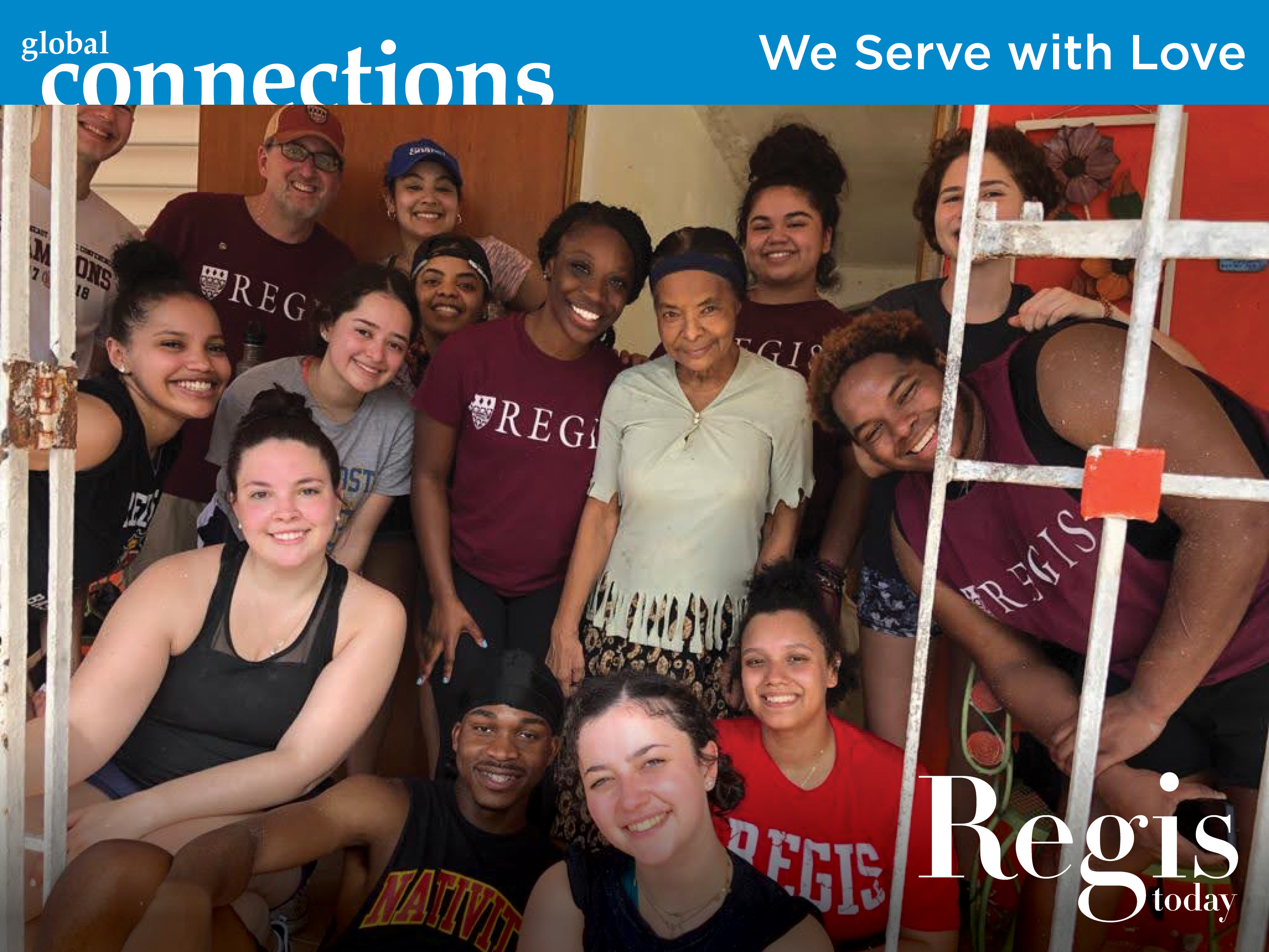
A service-immersion trip empowers students to make an impact
BY ALLYSON MANCHESTER
A service-immersion trip to Puerto Rico during spring break included many profound experiences, including an educational walk through Old San Juan and an afternoon digging mud trenches for trail maintenance in El Yunque National Rainforest. But the 14 students, faculty, and staff members who traveled there agree that the most impactful moments were spent with an elderly Puerto Rican woman named Ramona.
“Back in 2017, Hurricane Maria caused severe damage to Ramona’s small cement home,” explains counseling psychology graduate student Chanelle Garcia ’18, ’21, a graduate assistant in the Center for Ministry and Service (CMS), which organized the trip. “In the years that followed, Ramona sought help from city hall and the mayor’s office—all to no avail. It wasn’t until the social service organization Endeavors found out about Ramona’s case that we were able to step in to help on site.”
For three days, Regis students divided and conquered to restore Ramona’s home. They scraped old paint off of her walls and fence, cleared hundreds of pounds of debris from her backyard, power-washed her roof, and deep-cleaned the inside of her house.
“We got into a routine of waking up early, packing a lunch, and working all day in the heat,” says Garcia.
“As we cleaned up the home, we were able to ask for Ramona’s consent before making changes,” adds Claudia Díaz ’21, a native of Puerto Rico and a therapeutic recreation major at Regis. “We gave Ramona a mask and a brush and got her involved in the work. Through our service, we were able to contribute to her emotional shift and help empower her. Ramona is the embodiment of resiliency.”
Bridging Cultures
Each year, dozens of Regis students sign up to spend their winter or spring breaks on service-immersion trips through the Center for Ministry and Service, which has a longstanding tradition of bringing students to learn in areas such as South Dakota, Kenya, and the Los Angeles/Mexico border. In spring 2020, the office launched the trip to Puerto Rico, a site with unique flavor and close ties to the Regis community.

“Puerto Rico was an ideal location for a service trip because there is still a lot of need on the island in light of Hurricane Maria,” Garcia says. “But we also wanted our students to know the history behind the U.S. colony and realize how that history impacts the people who live there. With a growing population of students from Puerto Rico at Regis, it’s important for our whole community to cultivate a connection with the place.”
Prior to the trip, students viewed documentaries on Hurricane Maria, discussed the cultural differences between Puerto Rican immigrants and Puerto Ricans who still live on the island, and participated in team building exercises. “It was key to establish a family dynamic early on,” Garcia says.
That dynamic was solidified when the group attended a welcome dinner—a traditional Puerto Rican meal of chicken, rice with pigeon peas, and homemade flan and tres leches (milk cake)—at Díaz’s family home. The ability to have the gathering was something that Díaz never expected when she enrolled at Regis.
“Sometimes when you’re part of two different cultures, you tend to keep them separate,” Díaz says. “My family does not speak English, so I was afraid that communication would be a challenge. Then, once everyone came to my house, I was amazed to see people laughing, sharing photos, and connecting in spite of the language barrier. Everything flowed so well.”
The service in Puerto Rico, especially the work at Ramona’s house, aligns with the “person-first” approach that students learn in their academic majors at Regis. Alexa Cuellar ’21 (above left) and Sean Toomey ’20, two other participants on the Puerto Rico service trip, are intimately familiar with this concept—and passionate about putting it into action. Cuellar, a social work major with a minor in Spanish and Latin American studies, served as one of the group’s student leaders.
“In the social work major at Regis, we learn how to practice a high level of compassion and understanding when serving our clients,” Cuellar says. “The humanitarian principles that we learn in class tied in directly with the service in Puerto Rico. We were not in Puerto Rico to be 'saviors,' but instead to learn and serve with humility, responsibility, and love.”
Toomey, a political science major, says that his coursework helped him to understand the deeply rooted and often invisible power structures that have contributed to poverty in Puerto Rico.
“Residents on the island have no one in the mainland U.S. to advocate for them,” Toomey says. “It has been shocking to acknowledge the disparity between what actually happens in Puerto Rico and the story that the media in the continental U.S. portrays, specifically when it comes to the Hurricane Maria aftermath.”
Garcia sees service as the most effective pathway to empowering the people of Puerto Rico and overcoming the barriers that exist between the island and the continental U.S. “Our work with Ramona proved to me that connection is always possible. Even language is not a barrier when there is service and clear love being shown.”
Read more articles
Read the entire magazine online